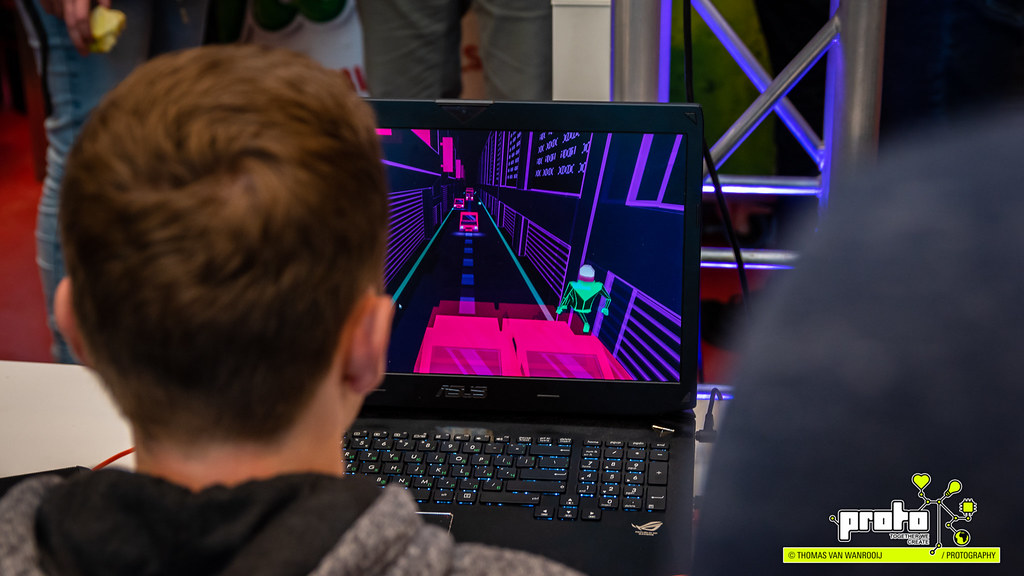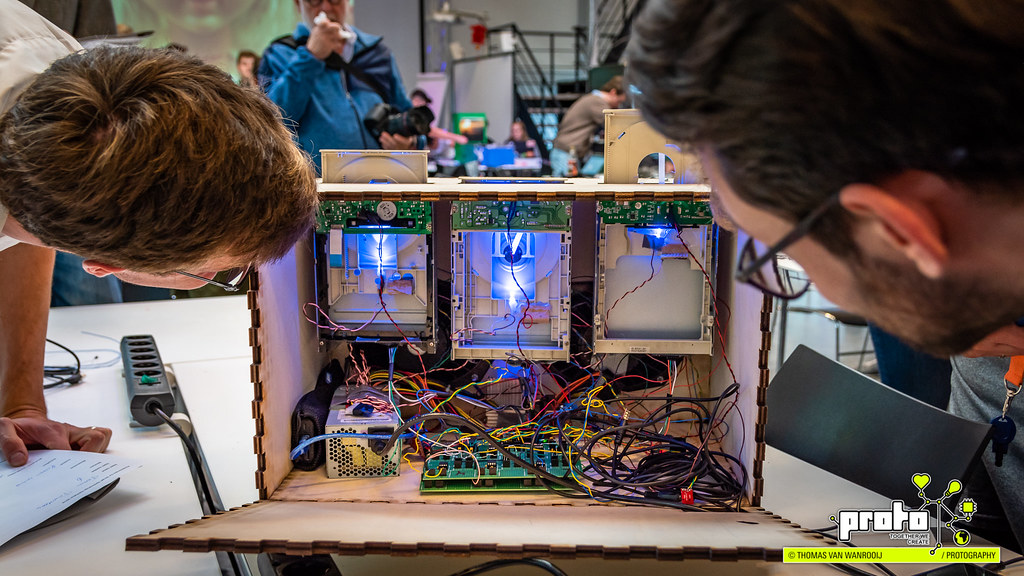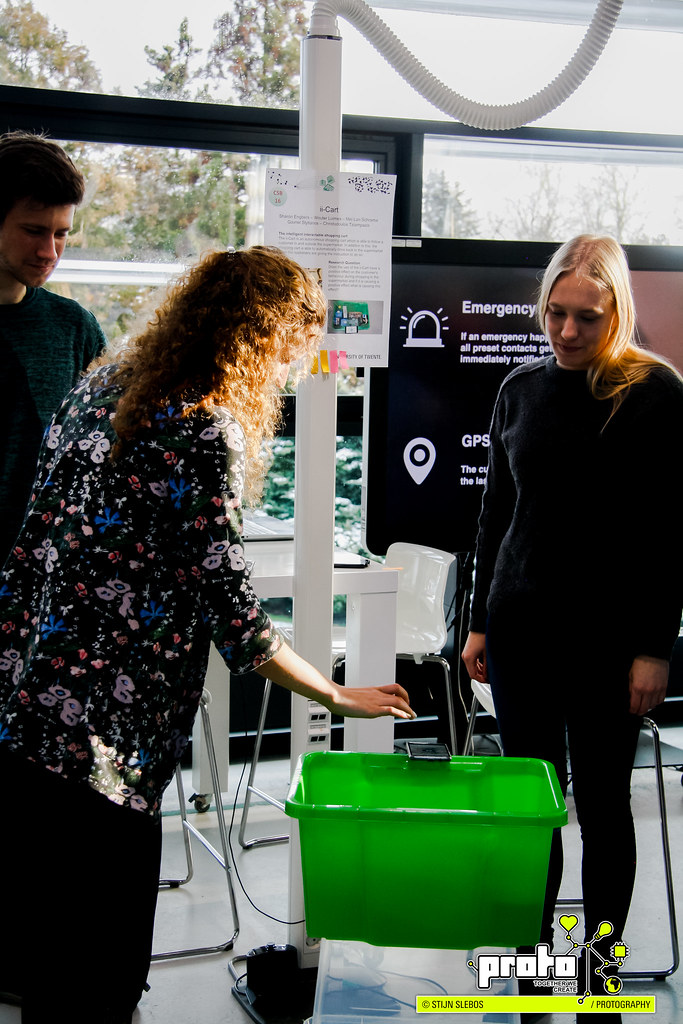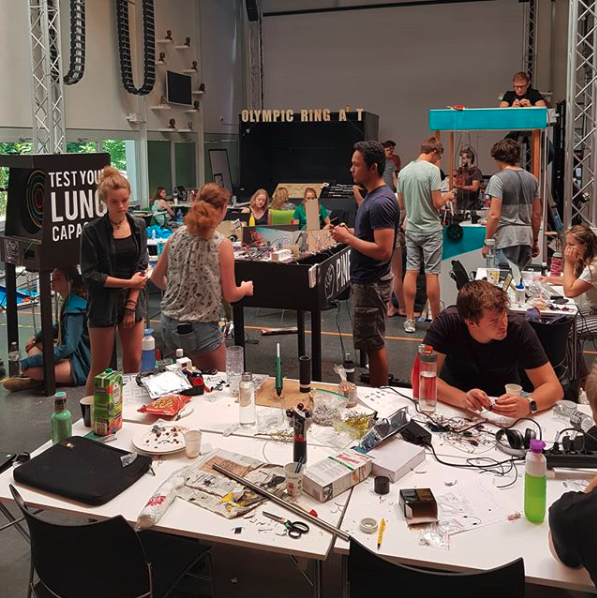In year 2, you will be fully equiped with a lot of basic skills in various disciplines from the first year. With this skill set, you will specialize in the second year and follow some more in-depth courses. Towards the end of the year, you will have acquired knowledge and skills in many different disciplines, technical as well as human centered interaction design.
- Module 5: Specialization
This module is an elective module: you get to choose between the modules of: Smart Technology, Interactive Media (both taught at UT), or Humane by Design (taught at VU Amsterdam). The subjects in these three sub-modules vary, but both will offer you fundamental knowledge of tools you will frequently use when you carry out your profession.
Module 5: Interactive Media
 Interactive media in general allow a person to control and interact with combined types of media such as images, computer graphics, animations, sound, video, newer media such as virtual reality or augmented reality, and more. The focus of the Interactive Media module, in particular the IM Core, is on various skills and understanding techniques for Interactive Media products and the end product will be a game prototype. The module consists of the following courses:
Interactive media in general allow a person to control and interact with combined types of media such as images, computer graphics, animations, sound, video, newer media such as virtual reality or augmented reality, and more. The focus of the Interactive Media module, in particular the IM Core, is on various skills and understanding techniques for Interactive Media products and the end product will be a game prototype. The module consists of the following courses:- Interactive Media Development: The course content of Interactive Media Development consists primarily of guided framework for developing interactive media in a group. The beginning of the course kicks off with a multi-day Game Jam project. Your experience in the Game Jam create a foundation for the more extensive development project that you will present at the end of the course.
- Game Design & Analysis: Based on the book “The Art of Game Design” by Jesse Schell, the course starts with techniques that are fundamental for many different sorts of Interactive Media products, including games, narration, movies, and interactive installations. It then continues with more game-specific topics like design of game mechanics, interfaces, aesthetics, and multiplayer aspects. An important part for our course is the material on playtesting.
- Advanced 3D Modeling and Animation: The course starts with a reminder of foundational 3D modeling techniques and choosing an appropriate level of detail to balance performance and aesthetics. Course content includes different 3D modeling approaches, setup and adjustment of materials, texture optimization, UV mapping, rigging for animations, 3D animation, and use in a game engine. The course is taught using the applications Blender and Unity. For the end of the course, you will define a course project. The project is ideally also used for the Interactive Media Development course, but a separate project can be defined.
- Game Engine Technology & XR Reality: The course covers part of the official Unity learning tutorial to train your programming skills in the context of a game engine. Beyond this, course content deals with code structure strategies for interactive media projects, and considerations for developing XR content. To complete the course, you will have to define and complete a development challenge. Ideally, the challenge is part of the Interactive Media Development course, but a separate challenge can be defined.
- Creative Composition of Visuals, Sound, and Motion: Preparation and production of audio-visual content, in the form of a short animation, using tools & skills for visuals & sound, 2D and/or 3D design elements, and various forms of compositing content.
- Math for 3D graphics and Game Development: The course content consists of lectures on previously introduced mathematic principles with a focus on solving creative problems in code through mathematics. Tutorials in the course help you with solving such problems and developing a familiarity for applied mathematics in interactive media developments.
- Professional Development: the course in which you are free to pick a direction for your own personal development. You can choose a training, a course or workshops that will help you develop futher as a Creative Technologist.
Module coordinatorM. A. Gómez Maureira PhD (Marcello)Citadel H203Module 5: Smart Technology
 The focus in this module is on physical (mostly electrical or mechanical) systems like electronics, sensors, controlled systems and the interfacing of such systems to the digital world. In addition, signal descriptions in time and frequency domain play an important role, as well as modification and conversion of signals in time and frequency domain. The module consists out of the following courses:
The focus in this module is on physical (mostly electrical or mechanical) systems like electronics, sensors, controlled systems and the interfacing of such systems to the digital world. In addition, signal descriptions in time and frequency domain play an important role, as well as modification and conversion of signals in time and frequency domain. The module consists out of the following courses:- Hackaton Project: A few days of full-time project work in which you can apply all the knowledge you learned in the other courses of this module. The hackaton is a really fun way to close off the module.
- Circuits and Electronics: this course trains basic understanding of electronic components (resistor, capacitor, inductor, transistor, IC etc) and their applications in electronic networks, filters, amplifiers, converters, etc.
- Modelling and Control: in this course you will learn about the interaction between technical subsystems. You will also learn about various aspects of control systems.
- Systems and Signals: the main goal of this course is to introduce you to some concepts from the mathematical theory of signals and systems.
- Sensors: in this course all the necessary steps in a given sensing system are explained. In addition, the necessary tools, like periodic/aperiodic signals, ADC design, amplifiers, and conditioning circuits, are deployed, aimed at embedded system design.
- Professional Development: the course in which you are free to pick a direction for your own personal development. You can choose a training, a course or workshops that will help you develop futher as a Creative Technologist.
Module CoordinatorModule 5: Humane by Design
The elective module Humane By Design invites students to engage with future world-building through Speculative Design and Participatory Design methods. In the core course, students are introduced to methods for inclusive and participatory design of fair futures; and approaches to use speculation, science fiction, and critical design in their work. In the Utopias & Design Futures project course, the students will develop their own design fiction to address big societal challenges. In the Fairness in Data Science Course, students will learn how to take a critical look at data and anticipate and intercept biases that may form.
- Humane by Design Core: In this course, which is tightly interwoven with the Utopias & Design Futures project course, students will be introduced to the theory and tools that will help them create visionary speculative designs for humane futures. The students will get to know Participatory Design methods and organize and conduct their own co-design workshop(s). Furthermore, the students will engage with diversity, equity, inclusion and accessibility in design and technology development. For example, an excursion to the Dutch Design Week is planned, during which the students will research and reflect on exhibited projects that address diverse and inclusive futures.
- Fairness in Data Science: This course introduces students to critical thinking skills when handling data-based evidence. Data-based evidence is everywhere and is used in academic research, media, and business. This course covers the various ways in which evidence in data form might be examined, distilled, and mobilized in a design project. What are the objectives of data analysis? How can you quantify certainty and uncertainty in conclusions? This course brings critical thinking to the reading and handling of data.
- Utopias and Design Futures Project: In this project course, students will work on a Speculative Design project in a pressure cooker setup. That means that students will iterate on their projects in increasing time frames, from 1 day to three full weeks. The final output of this course is a high-quality, interactive design fiction prototype, and an accompanying project report.
- Professional Development: In consultation with an assigned mentor, students identify a challenge in one of the pillars of professional development – exploring, profiling, deepening and widening. Students work on this challenge for the equivalent of 0.5 EC and submit a reflection report as an end assignment. In addition, they work on their portfolio in an ongoing manner.
Module coordinator - Module 6: Interaction Design
 In this module, the focus is on human centered design and you will create an interactive system and evaluated it with potential users. The module consists of the following courses:
In this module, the focus is on human centered design and you will create an interactive system and evaluated it with potential users. The module consists of the following courses: - Design and Research of User Exerpience (theory & project): this study unit is about designing, realising, and evaluating the interaction between people and technical systems. Within the unit, students design an interactive system and evaluate it with potential users. In the project, the students work in teams to design and evaluate an interactive system. Through lectures, tutorials and self-study on the design and evaluation of human-computer interaction students learn about various methods for conducting user studies, and quantitative and qualitative methods to analyse the resulting data.
- Data Analysis for CreaTe: in this course, you will learn the statistical methods that can be used, among other things, to analyse data obtained in user tests. The purpose is to analyse the results of enquiries and experiments in a justified statistical way.
- Professional Development: the course in which you are free to pick a direction for your own personal development. You can choose a training, a course or workshops that will help you develop futher as a Creative Technologist.
Module Coordinatordr.ir. R. Klaassen (Randy)Assistant Professor - Module 7: Hands-on AI
The overall topic of the module is Artificial Intelligence. It includes a technical part, ethics, and Professional Development. The approach for the technical part is hands-on, i.e., theory will be motivated and complemented by practical examples. It consists of an Artificial Intelligence (AI) theory part with focus on Machine Learning (ML), a Programming part based on Python, and a practical part where the ML algorithms are applied for a running example on a dedicated hardware. The dedicated hardware is a touch-sensitive patch, and the running example is digit recognition applying the different versions of ML taught.
The module consists out of the following courses:
- Artificial Intelligence: The AI theory course will provide a comprehensive overview of the fundamentals of AI, from basic data analysis to modern-day deep learning methods, with practical examples, explanations of the intuition and mathematical underpinnings of widely used approaches.
- Programming for AI: this programming course offers a practical introduction to Python, focusing on its application in AI, algorithms, and data structures. Students will develop skills in object-oriented programming, the use of Python libraries, data manipulation, and memory management.
- Hands-on AI Project: The hands-on part of the module runs in combination with the AI-theory and Programming.
- Ethics of AI: this component will provide you with the tools to critically assess AI applications in different fields.
- Professional Development: the course in which you are free to pick a direction for your own personal development. You can choose a training, a course or workshops that will help you develop futher as a Creative Technologist.
Module Coordinator - Module 8: Data From the Source to the Senses

Module 8 is the last one in which you will work together with fellow students. It centres on the Hybrid Worlds project, in which you will collaborate with a big team on an installation that connects the physical world with cyberspace. It is the crown to all the other CreaTe modules so far, so you will get to combine all that you have previously learned. The module consists out of the following courses:
- Hybrid Worlds Project: in this project, knowledge and experience from the tracks Interactive Media and Smart Technology get integrated in the design, implementation and actual building of an installation for physical data visualization.
- Internet Technology: this course addresses the basic principles of modern networks systems, thereby addressing both the general principles, and their concrete application in the internet.
- Data Driven Applications: this course teaches you how to managae data, with a focus on knowledge usable to build web applications. You will learn about data modeling using Entity Relationship models and their translation into database schemas.
- Data Visualization: in this course, you will work on learning both conceptual and practical skills related to the useful visualization of data.
- Professional Development: the course in which you are free to pick a direction for your own personal development. You can choose a training, a course or workshops that will help you develop futher as a Creative Technologist.
Depending on your interest and your specilization in module 5, you also get to choose another specialization course. You can choose between:
- Sound Design
- Sensor Technology in Sports
- Dangerous Design
Module CoordinatorA. Briassouli PhD (Alexia)Assistant Professor
